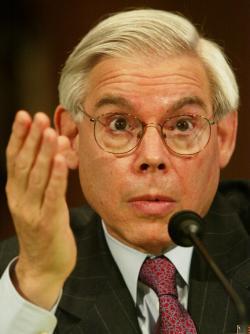The inability to get mass refinancings of underwater mortgages is one of the signature failures of economic policy of the past four years. In a fascinating and revealing story published by ProPublica on Oct. 25, Jesse Eisinger explains how several board members and executives of Freddie Mac, the now-taxpayer-owned mortgage giant, made essentially impossible to get a significant number of refinancings done. According to Eisinger, one of these board members, Robert Glauber, objected on the grounds refinancings were “designed to be a stimulus.” Why that would be an objection is hard to understand, but Glauber, a Republican appointee to the Treasury Department by President George H. W. Bush and a former CEO of the NASD, was supposedly steadfast in his opposition.
This brought to mind my encounter with Glauber back in 2002 when I was negotiating a resolution to the “analyst” cases, which were then viewed as the most significant restructuring of Wall Street’s interface with the general investing public in many years.
The particular issue in 2002 had to do with spinning, a process whereby CEOs and other senior executives at companies would be given personal allocations of “hot” IPOs by the investment banks underwriting the IPOs. Hot IPOs are those in which the stock is expected to jump when trading opens, and so an allocation leads to instantaneous trading gains—often very substantial in magnitude. Why did the investment banks give the executives this option? The companies run by the CEOs were good clients, and the banks wanted these companies to continue to direct business to the investment banks.
I asserted that the practice had to stop, on the grounds that the particular behavior amounted to little more than commercial bribery. If the investment bank wanted to bestow a gift on the company to maintain the client relationship—something the bank is entitled to do—then the benefit should go to the shareholders, not the CEO. If the CEO takes it individually, as they do when they take the stock granted in a spinning allocation, it is just a fancy form of bribery. Indeed, my office recovered vast sums of money from CEOs on just this theory.
At the time, my office was trying to negotiate a global deal with the New York Stock Exchange, headed by Dick Grasso, the SEC, headed by Harvey Pitt, and the NASD, headed by Glauber. At a late night negotiating session, I demanded an end to all spinning. Glauber and the others were vehement that CEOs be permitted to continue to get this perk. After much back and forth, in order to move things forward, I agreed, even though I was, and am, convinced that spinning is inherently a violation of the fiduciary obligation of the CEO. The next morning, having slept poorly on the matter, I called Glauber and the others back and said I could not go along with the deal we had agreed to the evening before. There had to be a total ban. I remember Glauber, in particular, was outraged. Didn’t CEO’s have any rights he asked? Sure they did, I said; but violating fiduciary duty was not one of them. After much back and forth, and some frayed feelings, they acceded to a total ban on spinning. It was without a doubt the right result.
All of this is relevant because it puts in context the warped world view of those who have done all they could to prevent refinancings that would have benefited middle-class home owners and revivied the economy, and yet managed to rationalize all the perks that were afforded to CEOs at the height of the bubble.
Eisinger’s wonderfully insightful article sets out the many roadblocks that were created to prevent a meaningful recovery for middle-class homeowners. Unfortunately, the deeper question about how those at the top of the corporate pyramid often view their obligations to the larger base below them—shareholders, workers, and consumers—has yet to be resolved.
